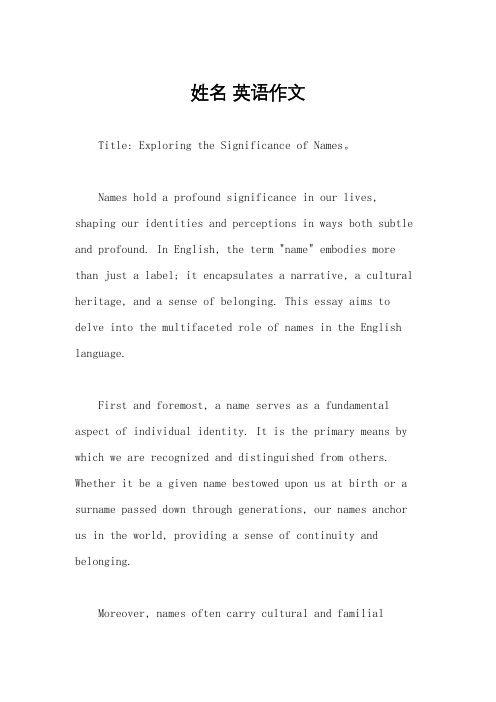2013中考英语作文:The Meaning of Name
名字叫我自己的英语作文

In the realm of personal identity, ones name holds a significant place. It is not merely a label but a reflection of ones cultural heritage, family lineage, and sometimes even aspirations or characteristics. Heres a composition about the importance and meaning of ones own name in English:My name is a unique identifier that sets me apart from the billions of other individuals on this planet. It is more than just a collection of letters it is a symbol of my existence and a representation of my identity.I was named by my parents, who poured their love and hopes into the choice. Each syllable carries a story, a wish for my future, and a connection to my roots. My first name is a gift from my mother, who chose it for its beauty and the strength it represents. It is a name that has been passed down through generations, a testament to the continuity of our familys legacy.My middle name, bestowed upon me by my father, is a nod to my cultural heritage. It is a bridge to my ancestors, a reminder of where I come from, and a connection to the traditions that have shaped me. This name is a silent promise to uphold the values and the spirit of those who came before me.The surname, a part of my name that I share with my family, is a symbol of unity and belonging. It is a reminder that I am part of something larger than myself, a lineage that extends far beyond my own life. This name is a bond that ties me to my kin, a shared history that we all carry forward.As I grew older, I began to understand the weight that my name carries. It is not just a name but a legacy, a responsibility, and a source of pride. It is a constant reminder of who I am, where I come from, and what I stand for.In the diverse tapestry of the world, my name is a thread that weaves through the fabric of my life. It is a beacon that guides me, a compass that points me towards my destiny. It is a part of me, as integral as the air I breathe and the blood that courses through my veins. In conclusion, my name is more than an identifier it is a narrative of my life, a story that is uniquely mine. It is a badge of honor, a declaration of my individuality, and a celebration of my essence. It is my name, and it is me.This composition is a reflection on the significance of ones own name, exploring its cultural, familial, and personal dimensions. It emphasizes the importance of understanding and embracing the meaning behind the names we carry.。
名字意义英语作文

名字意义英语作文The meaning of a name is often a reflection of cultural, historical, or personal significance. In many cultures, a name holds a deep significance and can carry a lot of meaning. For example, in English, names often have origins in other languages and can have specific meanings or connotations.In my opinion, the meaning of a name can have a significant impact on a person's identity and how they are perceived by others. It can also influence their self-image and confidence. For example, a name that means "strength" or "bravery" may instill a sense of empowerment in the person who bears it.In Chinese culture, names are often chosen based ontheir meanings and can reflect the parents' hopes and aspirations for their child. For example, a name might mean "peaceful" or "wise," reflecting the parents' desire for their child to embody those qualities.Personally, my name has a particular meaning that is important to me. It reflects qualities that my parentswanted me to embody and serves as a reminder of their hopes for my future. Knowing the meaning of my name gives me a sense of connection to my family and its cultural heritage.In conclusion, the meaning of a name can have a profound impact on a person's identity and can hold deep personal significance. Understanding the meaning of one's name can foster a sense of connection to one's cultural heritage and can shape how a person perceives themselves and isperceived by others.名字的意义通常反映了文化、历史或个人的重要性。
姓名 英语作文

姓名英语作文Title: Exploring the Significance of Names。
Names hold a profound significance in our lives, shaping our identities and perceptions in ways both subtle and profound. In English, the term "name" embodies more than just a label; it encapsulates a narrative, a cultural heritage, and a sense of belonging. This essay aims to delve into the multifaceted role of names in the English language.First and foremost, a name serves as a fundamental aspect of individual identity. It is the primary means by which we are recognized and distinguished from others. Whether it be a given name bestowed upon us at birth or a surname passed down through generations, our names anchor us in the world, providing a sense of continuity and belonging.Moreover, names often carry cultural and familialsignificance, reflecting our heritage and lineage. In many cultures, names are imbued with deep meaning, symbolizing cherished values, beliefs, or aspirations. For example, in some Native American cultures, names are chosen to reflect the natural world or spiritual qualities, thereby connecting individuals to their ancestral roots and the broader cosmos.Furthermore, names can shape perceptions and expectations, both for the individual and society at large. Research has shown that individuals with certain names may be perceived differently by others, leading to implicit biases and stereotypes. For instance, studies have demonstrated that individuals with traditionally "ethnic" names may face discrimination in employment or academic settings, highlighting the pervasive influence of names on social dynamics.On a more personal level, the significance of a name can evolve over time, reflecting the shifting contours of one's identity. As individuals navigate life's experiences and forge new connections, their names may come to embodydifferent facets of their personality or aspirations. For example, a person may adopt a nickname or alias that resonates more deeply with their sense of self, signaling a desire for self-expression or reinvention.In addition to personal identity, names also play a crucial role in interpersonal relationships and communication. The act of addressing someone by their name conveys respect, recognition, and attentiveness, fostering rapport and mutual understanding. Conversely, forgetting or mispronouncing someone's name can be perceived as dismissive or disrespectful, underscoring the importance of names in social interactions.In the realm of literature and language, names serve as potent tools for storytelling and world-building. Authors often invest considerable thought into naming their characters, selecting names that resonate thematically with the narrative or convey symbolic significance. From the biblical allegory of "Adam" and "Eve" to the whimsical nomenclature of "Harry Potter" characters, names enrich literary works with layers of meaning and depth.Moreover, names are integral to the preservation of historical and cultural heritage. By documenting and preserving names across generations, societies ensure the continuity of their collective memory and identity. Through genealogical research and oral histories, individuals can trace their lineage and uncover the stories embedded within their names, fostering a deeper appreciation for the rich tapestry of human experience.In conclusion, names are far more than mere labels; they are conduits of identity, culture, and meaning in the English language. From shaping individual identity to shaping societal perceptions, names wield significant influence in our lives, permeating every facet of human experience. As we navigate the complexities of identity and communication, let us recognize and celebrate the profound significance of names in shaping our shared reality.。
英语介绍自己姓名含义作文

英语介绍自己姓名含义作文英文:My name is Emily, and it means "industrious" and "striving" in English. I was named after my grandmother, who was a hardworking and determined woman. My parents chose this name for me because they wanted me to be strong and diligent in everything I do. 。
When I introduce myself to people, I often explain the meaning of my name and how it reflects my personality. I believe that being industrious and striving for success are important qualities to have, and I try to embody these traits in my daily life. For example, when I was in high school, I worked part-time at a local cafe to save moneyfor college. I was determined to achieve my goal of attending a good university, so I dedicated myself to my studies and worked hard to earn scholarships.中文:我的名字是艾米莉,它在英文中的意思是“勤奋”和“努力”。
英语介绍自己姓名含义作文

英语介绍自己姓名含义作文英文:My name is Emily, and it means "industrious" and "striving" in English. My parents chose this name for me because they wanted me to grow up with a strong work ethic and a determination to achieve my goals. I have always taken pride in my name and strived to live up to its meaning. 。
When I was in high school, I was determined to get into a top university. I spent countless hours studying and preparing for the SAT, and I also participated in various extracurricular activities to make my college application stand out. I remember my mom always telling me, "Emily, your name means 'striving,' so never give up on your dreams."In college, I continued to embody the meaning of my name. I worked part-time to support myself financially, andI also took on leadership roles in student organizations. Whenever I felt overwhelmed, I would remind myself of the significance of my name and push through the challenges.中文:我的名字是艾米莉,它在英语中的意思是“勤劳”和“奋斗”。
命名题英语作文

命名题英语作文全文共3篇示例,供读者参考篇1Title: The Importance of NamingIntroductionNaming is a fundamental aspect of human communication and interaction. From individuals to businesses and products, the names we choose have a significant impact on how we are perceived and how we perceive ourselves. In this essay, we will explore the importance of naming by examining its effects on identity, branding, and communication.Naming and IdentityOur name is often the first thing people learn about us, and it can shape their initial perceptions of who we are. Whether it's a personal name or a business name, the label we are given can influence how others view our abilities, personality, and background. For example, a name that is difficult to pronounce may lead to misunderstandings or miscommunications, while a name that is easily recognized and remembered can help us make a positive impression.In addition, our name plays a crucial role in shaping our sense of self. The labels we use to describe ourselves can influence how we see ourselves and how we interact with the world around us. For example, a nickname that highlights our strengths can boost our self-esteem, while a derogatory label can damage our self-image. By choosing names that reflect our values, goals, and aspirations, we can better align our external persona with our internal self-concept.Naming and BrandingIn the business world, naming is a key component of branding. A well-chosen name can help a company stand out from its competitors, attract customers, and build brand recognition. For example, a catchy and memorable name like Apple or Google can help a company differentiate itself in a crowded market and create a strong brand identity.Moreover, a name can convey important information about a company's products or services. For example, a name like "Amazon" suggests a vast and diverse range of offerings, while a name like "Nike" conveys a sense of speed, agility, and athleticism. By selecting names that align with their brand values and positioning, companies can create a cohesive andcompelling brand narrative that resonates with their target audience.Naming and CommunicationNaming also plays a critical role in communication. From job titles to product names, the labels we use can shape how we are perceived by others and how we interact with them. For example, a job title that accurately reflects our responsibilities and expertise can help us establish credibility and authority in the workplace, while a vague or misleading title may lead to confusion or skepticism.In addition, names can serve as powerful communication tools by evoking emotions, conveying information, and sparking interest. For example, a product name that highlights its benefits and features can attract customers and drive sales, while a name that is ambiguous or unappealing may deter potential buyers. By choosing names that are clear, compelling, and relevant to their target audience, companies can effectively communicate their value proposition and generate interest in their offerings.ConclusionIn conclusion, naming is a crucial aspect of human interaction and communication. Whether it's our personal name,a business name, or a product name, the labels we choose have a profound impact on how we are perceived by others and how we perceive ourselves. By selecting names that reflect our identity, branding, and communication goals, we can create meaningful connections with others, build strong brands, and convey our message effectively.篇2A name is more than just a combination of letters. It is a reflection of one's identity, culture, and aspirations. Choosing a name is a significant decision that can shape a person'sself-image and how others perceive them. In this essay, we will explore the importance of naming and the significance of names in different cultures.In many cultures, names are given based on family traditions, religious beliefs, or historical figures. For example, in some Asian cultures, names are chosen based on the meaning of the characters in the name. These meanings are often associated with virtues, blessings, or aspirations for the child's future. In Western cultures, names are often chosen based on family lineage, honoring relatives, or simply because the parents like the sound of the name.Names can also carry historical significance. For instance, African Americans often choose names that reflect their cultural heritage or commemorate significant events in their history. Names such as Malcolm, Mandela, or Harriet are not just names but symbols of resilience, courage, and freedom.Furthermore, names can also shape one's identity andself-esteem. Studies have shown that people identify with their names and that the meanings of their names can influence their behavior and choices. For example, a study published in the Journal of Experimental Social Psychology found that people named Dennis were more likely to become dentists than people with other names. This phenomenon, known as "nominative determinism," suggests that our names can have a subtle influence on our career choices and life paths.In addition to personal significance, names also play a vital role in social interactions. Names help us navigate the world, establish relationships, and communicate with others. When we meet someone new, their name is often the first thing we learn about them. Names can convey information about a person's gender, age, ethnicity, or cultural background. By using someone's name, we acknowledge their individuality and show respect for their identity.Names can also be a source of pride and empowerment. For marginalized communities, reclaiming their names and celebrating their cultural heritage can be a form of resistance against oppression and erasure. In recent years, there has been a growing movement to recognize and respect indigenous names, pronouns, and naming customs. This movement aims to challenge dominant narratives and promote diversity and inclusivity in society.In conclusion, names are more than just labels; they are a fundamental part of our identity and cultural heritage. Choosing a name is a meaningful act that connects us to our past, present, and future. Whether traditional or unique, names have the power to shape our self-image, relationships, and sense of belonging. By honoring and embracing our names, we affirm our identity and celebrate our diversity.Names matter. What's in a name? Everything.篇3Title: The Importance of Naming in English CompositionIn the world of writing, the process of naming is a crucial element that often goes unnoticed. The act of naming is not just about choosing a word or phrase to label something, but it isabout capturing the essence and identity of that particular thing. In English composition, naming plays a significant role in conveying meaning and evoking emotions, as well as establishing connections and building associations.First and foremost, naming is essential for clarity and understanding in English composition. When we give a name to something, we are providing a reference point for readers to identify and comprehend what is being discussed. For instance, using specific names for characters, places, or concepts in a story helps readers follow the narrative and grasp the significance of each element. Without clear and precise naming, the message of the writing can be lost or confusing to the audience.Moreover, naming has the power to evoke emotions and create a mood in English composition. By carefully selecting words that carry connotations and associations, writers can influence the reader's feelings and reactions. For example, using evocative names for settings or characters can create a sense of nostalgia, suspense, or excitement. The choice of names can set the tone and atmosphere of a piece of writing, enhancing its emotional impact on the audience.In addition, naming is crucial for establishing connections and building associations in English composition. When writersuse consistent naming conventions throughout their work, they create a sense of coherence and unity. By linking related ideas or characters through names, writers can help readers make connections and draw comparisons between different parts of the writing. This cohesive naming strategy can enhance the overall structure and meaning of the composition.Furthermore, naming in English composition can be a creative and expressive form of art. Writers have the freedom to invent new names, coin words, or play with language to convey unique meanings and ideas. By exploring different naming techniques, writers can add depth, nuance, and creativity to their writing. The act of naming can be a creative process that allows writers to showcase their imagination and originality.In conclusion, naming is an indispensable aspect of English composition that carries great significance and impact. It is not merely a superficial or technical task but a fundamental element that contributes to the clarity, emotion, coherence, and creativity of writing. Through thoughtful and deliberate naming, writers can effectively communicate their ideas, evoke emotions, establish connections, and showcase their artistic skills. Therefore, writers should pay careful attention to the namingprocess and harness its power to enhance the quality and effectiveness of their English composition.。
英语作文自己名字的意义

英语作文自己名字的意义英文:My name is Emily, and it holds a special meaning to me. The name "Emily" is of Latin origin and means "industrious" and "striving." This meaning has always resonated with me as I have always been a hardworking and determined individual. My parents chose this name for me because they wanted me to grow up with a strong sense of perseverance and dedication.In addition to its literal meaning, my name also holds personal significance. My grandmother, who was a strong and independent woman, had the same name. She was a role model for me and someone I always looked up to. Whenever I face challenges or obstacles, I think of my grandmother and her resilience, which gives me the strength to keep pushing forward.中文:我的名字是艾米莉,它对我来说有着特殊的意义。
这个名字源自拉丁语,意为“勤奋”和“奋斗”。
这个意义一直深深地触动着我,因为我一直都是一个勤奋和有决心的人。
李梦圆名字的含义和寓意英语作文

英文作文:The Meaning and Significance of the Name "Li Mengyuan"The name "Li Mengyuan" is a beautiful and profound one, carrying with it rich meanings and significant implications. Each character within the name holds its own unique significance, contributing to the overall meaning of the name.The first character, "Li," is a common surname in China, representing a family lineage and heritage. It is a symbol of stability and continuity, reflecting the values of tradition and respect for one's ancestors.The second character, "Meng," often carries the connotation of dreams or aspirations. It suggests a hopeful and optimistic outlook, representing a person's desires and ambitions for the future. This character encourages individuals to pursue their dreams and strive for a better tomorrow.Lastly, the third character, "Yuan," can mean "circle" or "completeness." It suggests a sense of wholeness and harmony, representing the idea of a perfect or ideal state. This character implies that the individual named Li Mengyuan possesses qualities of completeness and balance, striving to achieve harmony in all aspects of life.Taken together, the name "Li Mengyuan" embodies a powerful message of aspiration, hope, and harmony. It suggests a person who respects their heritage, dreams big for the future, and strives for a balanced and fulfilling life. This name is not just a label; it is a testament to the unique qualities and aspirations of the individual bearing it.中文翻译:“李梦圆”名字的含义和寓意“李梦圆”这个名字美丽而深刻,蕴含着丰富的意义和重要的寓意。
- 1、下载文档前请自行甄别文档内容的完整性,平台不提供额外的编辑、内容补充、找答案等附加服务。
- 2、"仅部分预览"的文档,不可在线预览部分如存在完整性等问题,可反馈申请退款(可完整预览的文档不适用该条件!)。
- 3、如文档侵犯您的权益,请联系客服反馈,我们会尽快为您处理(人工客服工作时间:9:00-18:30)。
2013中考英语作文:The Meaning of
Name
导读:本文2013中考英语作文:The Meaning of Name,仅供参考,如果能帮助到您,欢迎点评和分享。
中考英语作文是必考项,重要性不言而喻。
它也是让大多数学生最头疼的事情。
冰冻三尺,非一日之寒,练习英语写作也是一样,三天打鱼两天晒网是不行的,必须得持之以恒的练习,才会有进步。
中考频道精心为大家汇总了多篇中考英语作文范文资料,可以供同学和家长们参考。
Name is a word or a term used for identification. As for people, we all have our own names. It companies all of our life. It’s the symbol of us. In China, we usually get our first name from father. The second or the third names are different. Usually, our parents choose our names and they often have good wishes for our lives. For example, girls use the words that mean beautiful, elegant and so on. And boys have the words that mean strong, powerful or smart. I think name is important for us. Therefore, a good name is necessary.。
